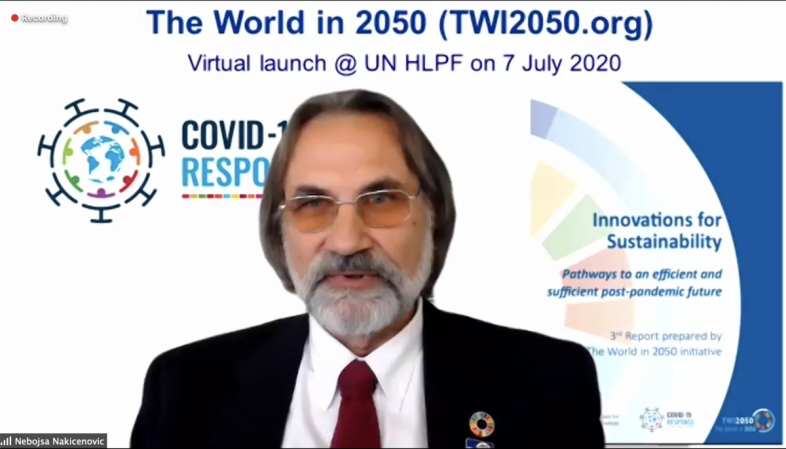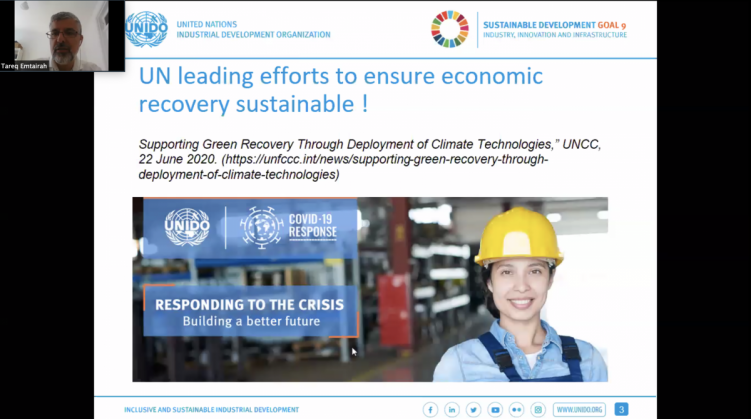Building Back Better Through Green Innovation
8th July 2020 – Under the auspices of the 2020 High-level Political Forum, the International Institute for Applied Systems Analysis (IIASA), the United Nations Industrial Development Organization (UNIDO), the Vienna Energy Forum (VEF) and the World in 2050 Initiative (TWI2050) organized the Side Event “Innovation to overcome COVID-19 and accelerate the transformative pathways to achieve the Sustainable Development Goals.”
In light of the COVID-19 crisis, the session promoted a rich dialogue around the theme of innovation, adaptation and transformation towards a path of sustainability. The panellists emphasized the crossroads the world currently faces to accelerate, amplify and kickstart a much faster pace towards a sustainable, equitable and fair future for all. Johan Rockstroem, author of the TWI2050 Report, urged the employment of the Sustainable Development Goals (SDGs) and the Paris Agreement to advance concrete operational actions that transcend policymaking, business models and societal behaviours at large.

The Side Event served as a platform to launch the third TWI2050 Report “Innovation for Sustainability: Pathways to an Efficient and Sufficient Post-pandemic Future.” Presented by Nebojsa Nakicenovic, former Deputy Director General/CEO of IIASA and TWI2050 author, the Report highlights the importance of an equilibrium between efficiency and utility for all, and sufficiency to avoid over-consumption, in the deployment and diffusion of innovation. Mr. Nakicenovic focuses on small-scale innovation as the most disruptive tool with the highest potential to achieve change and accelerate the SDGs.
Historically, innovation has been at the core of recovery measures from health, societal and economic challenges. Kristie Ebi, Professor at the University of Washington and TWI2050 author, drew from past experiences in overcoming the 14th Century Bubonic Plague. In this context, Ms. Ebi asserted the deployment of and investment in STIs solutions in the current COVID-19 crisis, including integrated surveillance for environment and health issues, digitalization, Big Data and Artificial Intelligence.

United Nations Agencies have joined efforts to compile instruments and action-programmes across the world to facilitate and support a sustainable recovery in areas related to policymaking, investment, industry and multilateral cooperation. UNIDO, through its mandate of Inclusive and Sustainable Industrial Development (ISID), spearheads actions to build back better through a greener and cleaner transition. In this respect, Tareq Emtairah, Director of the Energy Department, presented the Agency’s focus on energy efficiency as a main component and engine of job creation. In terms of Research and Development, Mr. Emtairah urges an alignment of businesses and governments with innovations and investments in sustainable transitions.
A sustainable recovery through the stimulus of a green economy must be understood as a multifaceted strategy that addresses short- and long-term effects, including employment, gender equity and resilience. As stated by Jeffrey Sachs, President of the Sustainable Development Solutions Network and TWI2050 author, “the only way to build back with full employment and proper use of our knowledge and resources is through a green recovery.”
The discussion culminated in a combined call for the incorporation and participation of a broad range of countries, including Developing and Least Developed Countries—not only in the dynamics of the transition, but also in the benefits of the innovation. To this extent, Mr. Emtairah laid next steps to be followed by governments and businesses around the globe: (1) tackle systemic inequality and access to innovation through community-level support, (2) encourage and reward innovators and entrepreneurs, (3) facilitate adoption in local markets, and (4) “bring everyone on board with us.”



